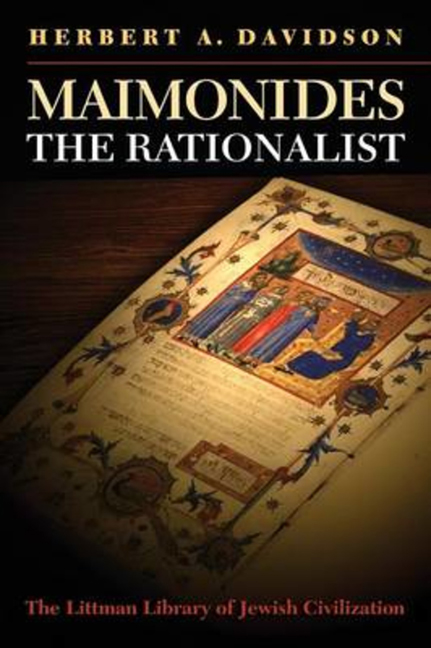Book contents
- Frontmatter
- Dedication
- Preface and Acknowledgements
- Contents
- Publisher's Note on Transliteration
- Abbreviations and Note on Sources
- 1 The Study of Philosophy as a Religious Obligation
- 2 The First Two Positive Divine Commandments
- 3 Maimonides' Knowledge of the Philosophical Literature in his Rabbinic Period
- 4 Maimonides' Shemonah perakim and Alfarabi's Fuṣūl Muntaza'a
- 5 Maimonides' Knowledge of the Philosophical Literature in his Later Period
- 6 Maimonides on Metaphysical Knowledge
- 7 A Problematic Sentence in Moreh nevukhim, ii. 24
- 8 Maimonides' Ethical Systems
- 9 Maimonides the Rationalist
- Works Cited
- Index
7 - A Problematic Sentence in Moreh nevukhim, ii. 24
- Frontmatter
- Dedication
- Preface and Acknowledgements
- Contents
- Publisher's Note on Transliteration
- Abbreviations and Note on Sources
- 1 The Study of Philosophy as a Religious Obligation
- 2 The First Two Positive Divine Commandments
- 3 Maimonides' Knowledge of the Philosophical Literature in his Rabbinic Period
- 4 Maimonides' Shemonah perakim and Alfarabi's Fuṣūl Muntaza'a
- 5 Maimonides' Knowledge of the Philosophical Literature in his Later Period
- 6 Maimonides on Metaphysical Knowledge
- 7 A Problematic Sentence in Moreh nevukhim, ii. 24
- 8 Maimonides' Ethical Systems
- 9 Maimonides the Rationalist
- Works Cited
- Index
Summary
Eliminate all other factors, and the one which remains must be the truth.
ARTHUR CONAN DOYLE The Sign of FourThe Setting
A SENTENCE IN Moreh nevukhim, ii. 24, could, if read in a certain way, serve to support Pines’ thesis that Maimonides rejected the possibility of man's acquiring metaphysical knowledge. The sentence comes at the culmination of a series of carefully reasoned arguments that are the backbone of the philosophical strand in the Moreh nevukhim.
Part II of the Moreh nevukhim opens with Maimonides demonstrating the existence of God. In order to have the most fundamental tenet of religion and philosophy stand on its own feet, no matter what position is taken on the issue of the creation or eternity of the world, Maimonides proceeds on parallel tracks. On the hypothesis of creation, he writes, the existence of a cause that brought the world into existence follows immediately; it went virtually without saying for him, as for other ancient and medieval thinkers, that whatever comes into existence has a cause bringing it into existence. The hypothesis of eternity was a bigger challenge and it receives most of Maimonides’ attention: he offers four philosophical ‘demonstrations’, that is to say, apodictic and conclusive proofs, for the existence of a first cause of the universe on the hypothesis that the world is eternal. A full demonstration of the existence of God requires that the ultimate cause of the universe be shown to be one and incorporeal, and Maimonides furnishes the requisite proofs of the unity and incorporeality of the first cause on both tracks.
The first of his four demonstrations on the eternity hypothesis reasons from the eternal motion of the celestial spheres to an incorporeal mover that constantly maintains them in motion. The second reasons from the existence of beings that are in motion and move something else and of beings that are in motion without moving anything else to the existence of a being that moves other things without undergoing motion itself. The third looks at things that are subject to generation and destruction. It argues that if whatever exists were of that sort, everything would eventually cease to exist and the universe would revert to nothingness; there must therefore be something that is not subject to generation and destruction but exists necessarily, in other words, eternally.
- Type
- Chapter
- Information
- Maimonides the Rationalist , pp. 212 - 234Publisher: Liverpool University PressPrint publication year: 2011

